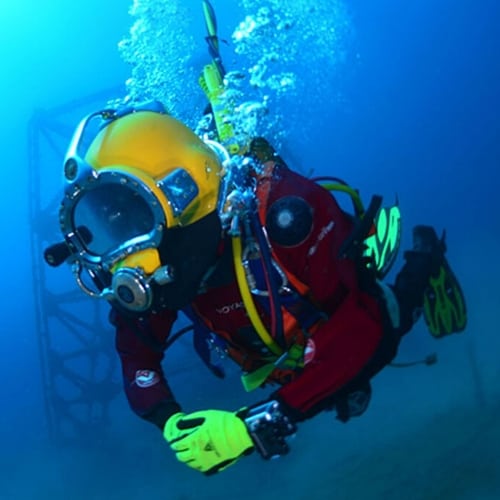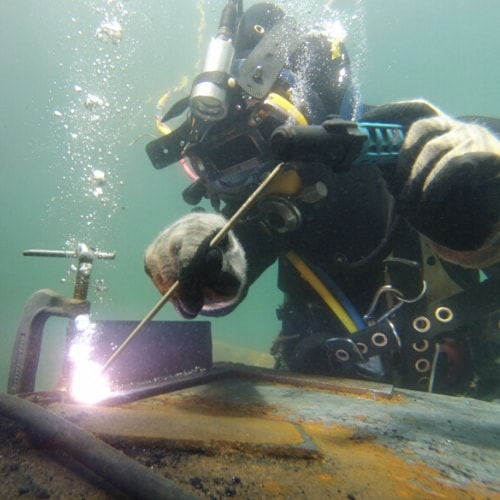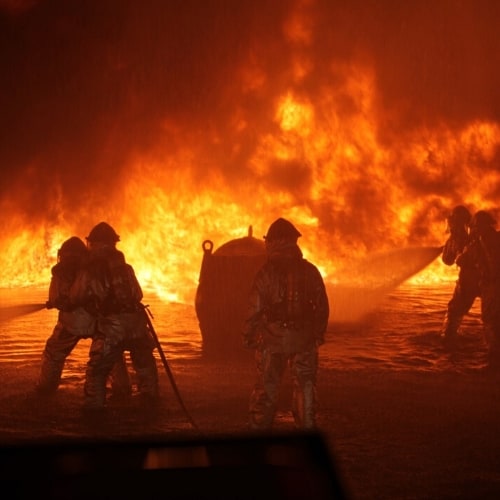Have you ever wondered about the 7 steps for avoiding electric shock when welding underwater? I think it’s fair to say that the idea of doing electrical work underwater is “shocking” to most people outside the underwater welding world. We all know that Water Plus Electricity Equals Tragedy.
Even so, underwater welding is not just a booming industry, but a profitable one, with the best and most experienced welders able to take home six figure salaries. How on Earth is that possible, and how do these divers avoid getting electrocuted while working underwater?
The answer is as complex and multifaceted as underwater welding itself. Even for an experienced diver, the dangers of the undersea world are ever-present, requiring constant vigilance.
The same holds true for anyone who works with electricity, especially in the high voltages necessary for welding. In short, underwater welders make use of specialized equipment and safety gear, perform equipment checks, use grounded sources, and undergo rigorous training.
Let’s take a look at how all of that works in action when it comes to divers and welders avoiding electric shock when welding underwater.
Here, you can find an article from our website about the topic of Hyperbaric welding.
Table of Contents
Understand How Underwater Welding Works
First and foremost, it is vital that underwater welders and divers understand how the process works.
Underwater welding is just what it sounds like, performing welding services on metal surfaces beneath the waves. This can be done in either a dry or wet setting. The former involves a hyperbaric chamber, which seals the diver off from the sea and, thus, provides a more stable environment.
The latter is most cost-effective, but higher risk as it involves performing welding in the open water.
In both cases, welding takes place much the same way as it does above ground. An electrical arc is used to generate high temperatures that are then used to meld joints and pieces of metal together.
Different techniques are used for different welding jobs and surfaces, which can, in turn, mean different safety precautions. You may use different torches for work on thermoplastics as opposed to metals, for example. Making sure you have the right tools for the job can help ensure that you don’t meet with an accident that can lead to an electrical shock.

Make Sure You Have the Proper Safety Equipment
Closely related to this, you need to make sure that you have high-quality safety equipment on hand. You should never dive, let alone weld, without having proper diving equipment, which includes:
High-quality Safety Equipment
- Helmet: A diving helmet for welding purposes needs to come with a welding screen, which both protects the wearer’s eyes while also being compatible with a breathing apparatus. There are three basic variants of diving helmet for welders, each of which can help protect against sparks, shocks, and the dangers of the undersea world. An open circuit helmet is the most popular and makes use of a non-return valve, which means the air you exhale is expelled from your mask into the water, which you’ll need to be aware of while welding. Reclaim helmets reclaim this expelled air and pump it back into your suit. A free-flow helmet is a highly simplistic model best used in shallow waters.
- Suit: Your diving suit needs to be well-insulated. Make sure your suit and gloves are made of rubber or features rubber lining. Your gloves should attach tightly around your wrists so no external water or slag can get in, which may pose an electrocution risk.
- Electrodes: Make sure that any electrode you are using for your welding is extremely water-resistant. You cannot use electrodes that do not have water-resistant coating, as these will lead to shocks.
- Stinger: Your stinger must likewise be well-insulated. Check to see how much protection your stinger can give you. Even amounts as high as 200 amps may be fine with the proper stinger. You don’t want to be fumbling around with your stinger underwater, so make sure that it is lightweight, easy to use, and that you will be comfortable using it for the duration of the project.
- Power Supply: Never use a power supply that is unstable. Choose your power supply like your life depends on it, because it very well might. When working underwater, it is essential that you use DC rather than AC equipment. The fact that direct current electricity flows in one continuous direction makes it more controllable and, thus, safer to use underwater.
We wrote an article listing all personal protective equipment – PPE that every welder must have. Find the article here.
Diving accessories
There are also many additional safety and diving accessories you’ll want to look into, including:
- Diving Knife: What’s an underwater adventurer without their trusty diving knife? For as much as they get used in action movies, diving knives are actually surprisingly versatile. They can help you wedge the door, free yourself from nets, or other things that can impede your movement. When you are unable to move freely, the risk of accidentally shocking or burning yourself grows higher. As such, even something as simple as a diving knife can help you ward off these risks.
- Gas Panel: We’ll talk about gases and how they can lead to electrical shocks in a moment, but for now, suffice it to say that you need to monitor gas levels very carefully.
- Backup Gloves: You never want to work with damaged gloves. Their rubber insulation is all that stands between you and your hands getting shocked. In case your active pair tears, make sure you have backups handy.
Make Sure Your Equipment Is in Good Working Order
Having all of this nice equipment won’t mean anything if you go into the water with them all in shoddy condition. It is, thus, of the utmost importance that you make sure that your equipment is all in pristine condition before using it. what should be the steps to take for avoiding electric shock when welding underwater?
You know the old DIY and construction saying, measure twice, mark once? You should be double and triple-checking your equipment before going beneath the waves or turning anything on. It always pays to be safer rather than sorry and shocked as a result.
If your equipment is old or in any way degraded, ditch it for a new model. While you may not want to shell out for pricey new undersea welding equipment, the cost of switching on electrical gear underwater with poor protection can be much higher and tragically so.

Precautions to Take When Cutting
One of the most overlooked electrical dangers when welding underwater is cutting into metal and other surfaces. You need to make sure that you are taking every possible precaution when cutting.
This means taking things slow. Trying to speed through things will likely only lead to tragedy.
Cutting too quickly, for example can lead to not just electrical shocks, but fire and explosions.
You should never use a cutting torch near a source of oxygen when the welding generator is on.
The Importance of Ground
Any time you work with electricity, it is of the utmost importance to make sure that you have a localized source of ground in place. This is especially true when it comes to underwater welding.
Given the prevalence of a conductor in water all around you, it is essential that you make sure that your electrical source is grounded for the purpose of avoiding electric shock when welding underwater.
Explosive Gases
While it’s electrical shocks that get all of the attention in terms of underwater hazards for underwater welders, you also need to make sure to check for explosive gases. If you are uncertain as to whether there are gas mixtures trapped in the area, you need to drill holes.
The last thing you want is to have to deal with an explosive buildup of dangerous gases that can be ignited with a single spark.
By drilling holes, you’ll be able to filter out the gases so it flows into the sea.
Common causes of explosive gases and electrical problems they can cause include:
- Petroleum, which can include different types of grease, gasoline, and fuel
- Types of mixed paint, such as linseed oil
- Adhesives, solvents, and epoxies
- Any ammunition or explosives you have on hand
- The unburned gas from your cutting torch
When it comes to safety precautions for avoiding electric shock when welding underwater, one of the most important things to realize is that everything is interconnected.

Mandatory Training
Finally, let’s put the safety risk involved here into context.
While the thought of working with electricity underwater may be understandably terrifying to those outside the industry, in fact, deaths are rare.
For example, the United States Navy records a single death in 1943 as the only one in its history directly linked to wet welding underwater. One reason that rate is so low is because welders and divers, both in the Navy and commercially, both undergo years of training.
Here, you can find an article from our website about how long does it take to learn welding?
It is vital that you drill yourself and anyone else who is engaged in underwater drilling in the proper use of materials and the aforementioned safety checks. The only thing standing between you and an electrical shock – even more so than the safety equipment itself – is knowing how to use it and understanding what you’re doing.
Follow these safety measures, and you can reap the benefits of underwater welding without any “shocking” consequences.
Source: pilebuck.com
More Welding Articles
How Long Does It Take To Learn Welding?
Different Types of Gas Welding Flame And Their Applications
Can Steel And Aluminum Be Welded Together?
Ever wondered how it’s possible to not shock while welding underwater?
>> Tutorial video

